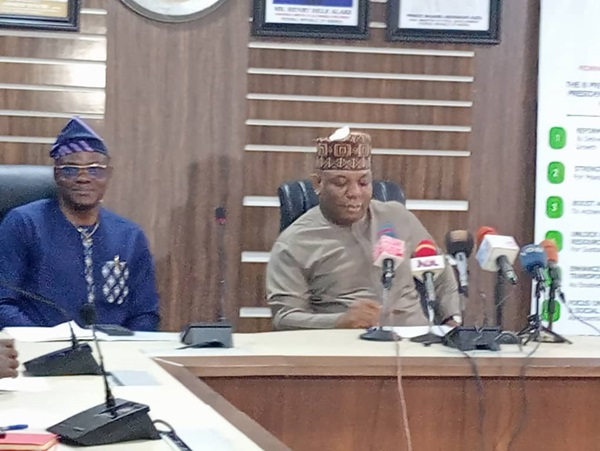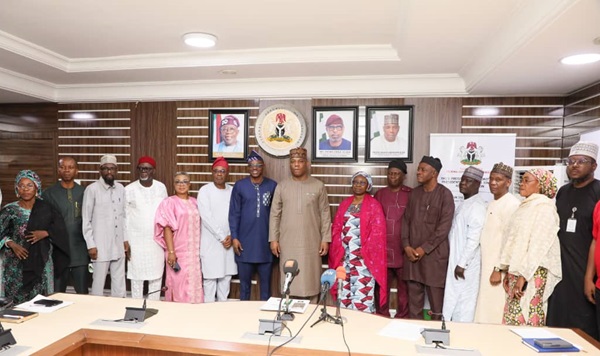
The Federal Ministry of Steel Development (FMSD) has reaffirmed its commitment to positioning Nigeria as the leading steel hub in sub-Saharan Africa, to revitalise the sector and boost national GDP.
The Minister of Steel Development, Prince Shuaibu Audu made this known during a media briefing in Abuja ahead of the 2025 Maiden National Steel Summit. The summit, themed “Rebuilding and Consolidating Nigeria’s Steel Industry: Collaborative Action for Sustainable Growth and Global Competitiveness,” will bring together industry stakeholders, investors, policymakers and development partners to chart a clear path for the sector’s revival.
According to the minister, President Bola Tinubu is expected to formally declare the summit open, underscoring the administration’s commitment to industrial transformation and economic diversification.
Audu emphasised that the summit aims to take stock of the status of Nigeria’s steel industry, explore investment opportunities, identify gaps in policy and infrastructure and formulate a consensus-driven approach to long-term sustainability and global competitiveness.
He said the Tinubu-led administration’s ‘Renewed Hope’ agenda is already deploying strategic interventions to resuscitate Nigeria’s steel value chain. These include utilising Nigeria’s abundant local raw materials for steel production as a substitute for imported products, currently costing the nation over $4 billion annually in foreign exchange.
“The Ministry is committed to promoting the local production of steel to reduce this heavy forex burden, create jobs, and drive industrialisation,” Audu said.
He noted that the federal government aims to establish a regulatory framework that supports both ferrous and non-ferrous metals production for domestic and international markets. Setting and monitoring quality standards for locally produced and imported steel products is also a core priority to prevent construction failures and improve consumer confidence.
“Beyond economic considerations, our policies are designed to stimulate employment, enhance technological innovation and facilitate technology transfer,” the minister added.
Audu revealed that the revitalisation of the Ajaokuta Steel Company is a major component of this agenda, with projections indicating it could contribute up to 400,000 metric tonnes of iron rods annually to the local market. According to him, the last 20 months have witnessed a renewed drive to resuscitate legacy assets such as Ajaokuta and the National Iron Ore Mining Company.
He said these efforts have already attracted significant investment interest. Notably, Stellar Steel Company has pledged $400 million, while a separate $100 million investment has been committed for the establishment of a galvanising plant.

Other milestones include legislative collaboration on key policy frameworks and improved collaboration with private-sector steel manufacturers. This, Audu noted, has resulted in increased capacity utilisation, driven by government-provided incentives and supervisory support.
The minister expressed confidence that with sustained momentum, Nigeria’s steel sector would soon transition from a struggling industry to a globally competitive one.
“We are optimistic that the targets we’ve set are not only achievable but well within reach. The media also has a critical role to play in promoting awareness of the summit and rallying public and investor interest,” he said.
Also speaking at the briefing, the permanent secretary of the ministry, Dr Chris Isokpunwu described steel as the bedrock of any serious industrial economy, directly linked to manufacturing, infrastructure development and technological innovation.
“This maiden National Steel Summit marks a turning point. It is an opportunity to bring all stakeholders together in pursuit of inclusive dialogue, actionable policy and strategic investment that will reposition the sector for long-term growth,” he said.
He commended the minister for his foresight and leadership and thanked the media for their role in elevating public discourse around the ministry’s reform efforts.
Also speaking, the director of information and public relations at the ministry, Salamatu Jibaniya expressed gratitude to journalists and media professionals for supporting the campaign to revitalise Nigeria’s steel sector.
She noted that the sector is now at a defining moment.
“Nigeria’s steel sector is poised to become a key catalyst for industrial transformation and economic resilience. What we’re witnessing is not just a summit, but a strategic blueprint for revival – one that incorporates adaptive policies, sustainable practices and global competitiveness,” she said.
The 2025 National Steel Summit is expected to serve as a launchpad for Nigeria’s renewed industrial ambition, offering a platform to consolidate progress, attract fresh investments and inspire a coordinated national vision for a sustainable and productive steel industry.

